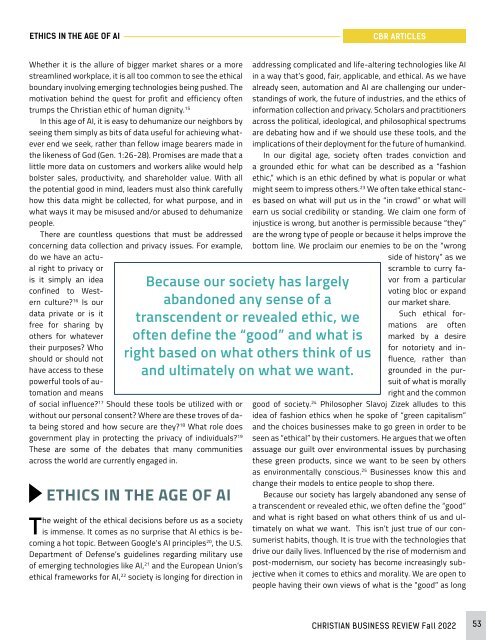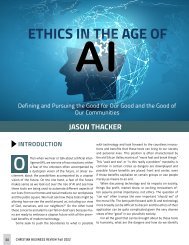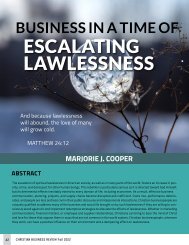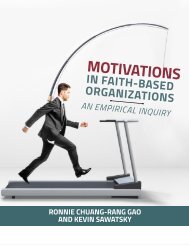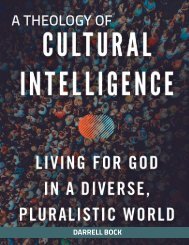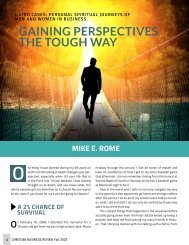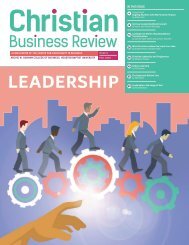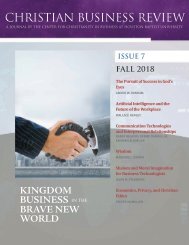Christian Business Review 2022: Pressing On Toward God's Goal
You also want an ePaper? Increase the reach of your titles
YUMPU automatically turns print PDFs into web optimized ePapers that Google loves.
ETHICS IN THE AGE OF AI<br />
CBR ARTICLES<br />
Whether it is the allure of bigger market shares or a more<br />
streamlined workplace, it is all too common to see the ethical<br />
boundary involving emerging technologies being pushed. The<br />
motivation behind the quest for profit and efficiency often<br />
trumps the <strong>Christian</strong> ethic of human dignity. 15<br />
In this age of AI, it is easy to dehumanize our neighbors by<br />
seeing them simply as bits of data useful for achieving whatever<br />
end we seek, rather than fellow image bearers made in<br />
the likeness of God (Gen. 1:26-28). Promises are made that a<br />
little more data on customers and workers alike would help<br />
bolster sales, productivity, and shareholder value. With all<br />
the potential good in mind, leaders must also think carefully<br />
how this data might be collected, for what purpose, and in<br />
what ways it may be misused and/or abused to dehumanize<br />
people.<br />
There are countless questions that must be addressed<br />
concerning data collection and privacy issues. For example,<br />
do we have an actual<br />
right to privacy or<br />
is it simply an idea<br />
confined to Western<br />
culture? 16 Is our<br />
data private or is it<br />
free for sharing by<br />
others for whatever<br />
their purposes? Who<br />
should or should not<br />
have access to these<br />
powerful tools of automation<br />
and means<br />
of social influence? 17 Should these tools be utilized with or<br />
without our personal consent? Where are these troves of data<br />
being stored and how secure are they? 18 What role does<br />
government play in protecting the privacy of individuals? 19<br />
These are some of the debates that many communities<br />
across the world are currently engaged in.<br />
ETHICS IN THE AGE OF AI<br />
The weight of the ethical decisions before us as a society<br />
is immense. It comes as no surprise that AI ethics is becoming<br />
a hot topic. Between Google’s AI principles 20 , the U.S.<br />
Department of Defense’s guidelines regarding military use<br />
of emerging technologies like AI, 21 and the European Union’s<br />
ethical frameworks for AI, 22 society is longing for direction in<br />
Because our society has largely<br />
abandoned any sense of a<br />
transcendent or revealed ethic, we<br />
often define the “good” and what is<br />
right based on what others think of us<br />
and ultimately on what we want.<br />
addressing complicated and life-altering technologies like AI<br />
in a way that’s good, fair, applicable, and ethical. As we have<br />
already seen, automation and AI are challenging our understandings<br />
of work, the future of industries, and the ethics of<br />
information collection and privacy. Scholars and practitioners<br />
across the political, ideological, and philosophical spectrums<br />
are debating how and if we should use these tools, and the<br />
implications of their deployment for the future of humankind.<br />
In our digital age, society often trades conviction and<br />
a grounded ethic for what can be described as a “fashion<br />
ethic,” which is an ethic defined by what is popular or what<br />
might seem to impress others. 23 We often take ethical stances<br />
based on what will put us in the “in crowd” or what will<br />
earn us social credibility or standing. We claim one form of<br />
injustice is wrong, but another is permissible because “they”<br />
are the wrong type of people or because it helps improve the<br />
bottom line. We proclaim our enemies to be on the “wrong<br />
side of history” as we<br />
scramble to curry favor<br />
from a particular<br />
voting bloc or expand<br />
our market share.<br />
Such ethical formations<br />
are often<br />
marked by a desire<br />
for notoriety and influence,<br />
rather than<br />
grounded in the pursuit<br />
of what is morally<br />
right and the common<br />
good of society. 24 Philosopher Slavoj Zizek alludes to this<br />
idea of fashion ethics when he spoke of “green capitalism”<br />
and the choices businesses make to go green in order to be<br />
seen as “ethical” by their customers. He argues that we often<br />
assuage our guilt over environmental issues by purchasing<br />
these green products, since we want to be seen by others<br />
as environmentally conscious. 25 <strong>Business</strong>es know this and<br />
change their models to entice people to shop there.<br />
Because our society has largely abandoned any sense of<br />
a transcendent or revealed ethic, we often define the “good”<br />
and what is right based on what others think of us and ultimately<br />
on what we want. This isn’t just true of our consumerist<br />
habits, though. It is true with the technologies that<br />
drive our daily lives. Influenced by the rise of modernism and<br />
post-modernism, our society has become increasingly subjective<br />
when it comes to ethics and morality. We are open to<br />
people having their own views of what is the “good” as long<br />
CHRISTIAN BUSINESS REVIEW Fall <strong>2022</strong> 532


